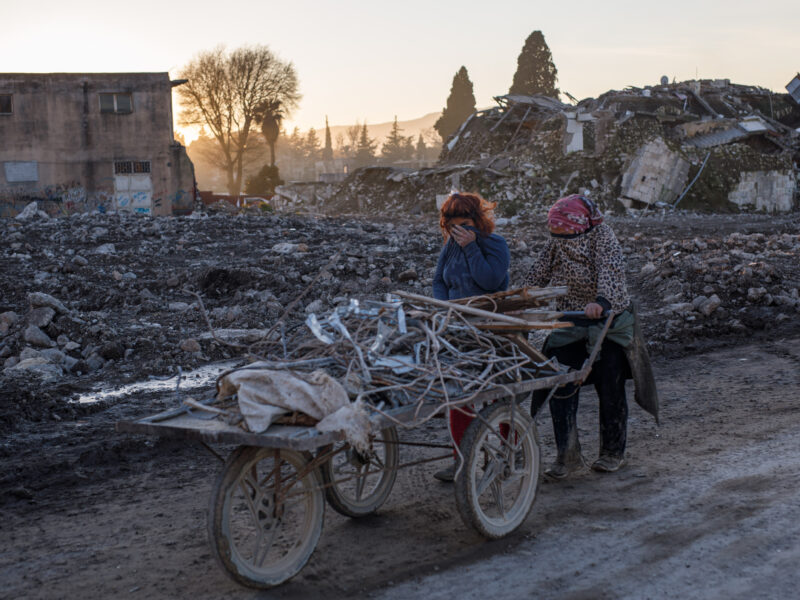When will we as a global community say enough is enough?
Recently, an incident occurred that should not be common but is: A woman—we will call her Ada—was assaulted by her husband. The couple had not been able to conceive a child, so her husband beat her, shouting insults while he did. Then, he threw her belongings out of the house into the night and told her not to return.
One of their neighbors who had heard the shouting came over, and convinced the husband to allow Ada back into the house. She remains there still, because like so many women suffering intimate-partner violence, she does not have anywhere else to go. The issue is exacerbated by her disability: Ada uses a wheelchair as a result of polio. With no job, Ada is dependent on her husband. Finding work is challenging because of her mobility issues and because she is uneducated. In Cameroon, where she lives, they do not believe sending girls with disabilities to school is necessary or worthwhile due to social stigma.
But what happened to Ada is far from an isolated occurrence. Violence against women and girls with a disability occurs around the world at astronomical rates. The UN estimates that women with a disability are at least three times more likely to experience violence from a partner, family member, or caregiver than women without a disability. The United Nations Population Fund estimates that between 40 and 68 percent of young women with a disability experience sexual violence before the age of eighteen.
To be a woman or a girl with a disability—physical, visual, intellectual, or multiple forms—is to always be vulnerable. We know this, because we both have a physical disability, from polio and scoliosis, respectively. We’ve both experienced various forms of discrimination and violence as children and women. And we both now work with survivors of violence with disabilities and their families.
One of the most painful realities we see in our work is that the violence perpetrated against a woman or girl with a disability is often done by someone who is supposed to care for them—a partner, a spouse, a caregiver, a teacher. These perpetrators have the advantage because they know their victims, or their families, are dependent on them. Like Ada, millions of women are forced to face the question, What do you do when the person you should be able to turn to is the one perpetrating the violence?
The difficult reality is that justice for these women is elusive. Women’s stories are often discounted, but a woman with a disability faces additional barriers to even having her story heard at all. There is an added layer of discrimination against them, as well as more practical hurdles. A deaf person who is unable to share her story without an interpreter. A woman in a wheelchair who needs transportation assistance to the police station or courthouse. A woman with an intellectual disability who may not even have the language to share what happened to her.
The complexity and scope of the problem are why we sent an open letter signed by more than 400 disability rights activists and our supporters to UN General-Secretary António Guterres, calling on him and his colleagues to support the creation, adoption, and implementation of a new Optional Protocol to the Convention on the Elimination of All Forms of Discrimination against Women (CEDAW) specific to ending violence against women and girls.
As we write in our letter: “With violence against women and girls in the spotlight, the specific and unique needs of violence against women and girls with disabilities has a chance to be seen and addressed in a larger and more comprehensive way.”
Nations’ familiarity with CEDAW—one of the most ratified treaties in the world—makes a new Optional Protocol the most sensible and expedient path to a binding framework that protects women and girls around the world, including and especially the most vulnerable, like us. An Optional Protocol to CEDAW would mandate various interventions proven to lower rates of violence, including legal reform, training and accountability for law enforcement and other professionals, comprehensive services for survivors, and violence-prevention education programs. Implementation could be monitored through a metrics-based system that would hold nations accountable for meeting clear benchmarks specific to States’ duties.
In other words, an Optional Protocol would require nations to address all forms of violence against all women and girls, in all spheres and under all circumstances—including better protection for women like Ada.
The alternative is to allow the violence to continue—an unconscionable alternative where women and girls around the world will continue to suffer. How many more women and girls must be harmed before the issue is taken seriously? It horrifies us to think that the men who perpetrate this violence will continue to get away with it, and go on to harm another woman, another child. When will we as a global community say enough is enough?
We know there is a solution. The international community has been working on this issue for more than 30 years, and it is time to take the next step.
As we write in our letter, “We have it within us to change the course of human history to one where every woman and girl lives a life free of violence.” The safety of women like Ada, like us, depends on it.



